
The Blockchain Behind Compassionate Care:
Secure, Transparent, and Efficient Healthcare
Introduction
To ensure the highest levels of security, transparency, and efficiency in our Compassionate Care Outreach program, we are building a custom blockchain, or appchain, to manage and track our operations. This is not merely a technological add-on, but a core component of our program that will enhance its mission. This blockchain will be used to track patient data, volunteer credentials, donations, and logistics. More importantly, it will secure and verify the program's data and processes.
Why Blockchain?
Transparency: Using a blockchain means that all transactions and data related to the program will be recorded on a public ledger. This will allow stakeholders to verify that the program is operating ethically, and how resources are used.
Security: Blockchain technology is very secure because it is decentralized and uses cryptographic methods to secure data, making it extremely difficult for data to be altered, tampered with, or deleted.
Efficiency: The use of blockchain can automate processes, such as scheduling appointments, managing volunteer credentials, tracking donations and supplies, and verifying patient data, making the program more efficient and streamlined.
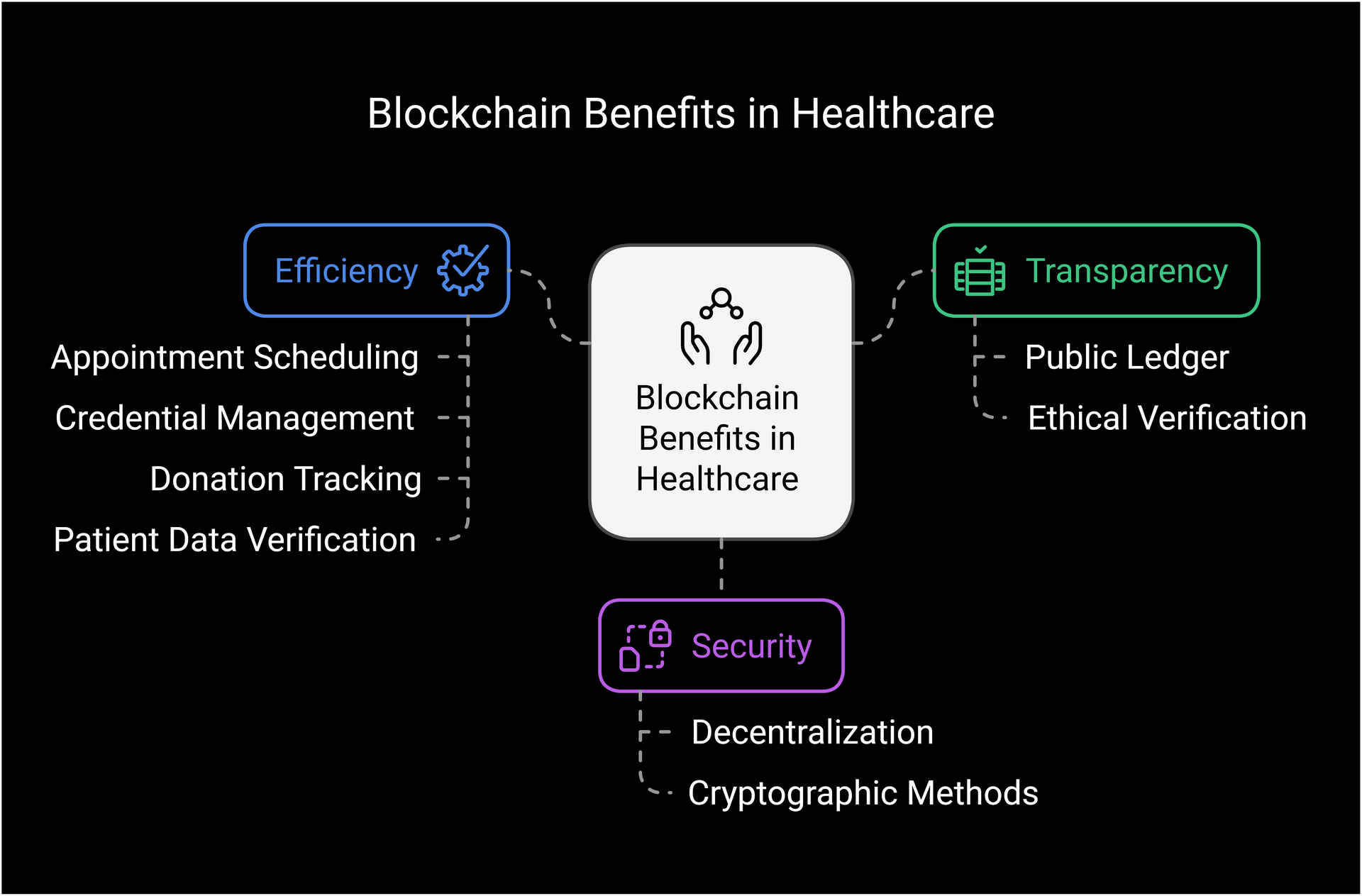
What is an Appchain?
An appchain is a custom-built blockchain designed for a specific application. It is different from general-purpose blockchains like Bitcoin or Ethereum. Using an appchain allows for a high degree of customization and control over the network's functionality. This appchain will be a separate, independent system, not connected to any other public blockchain. It is tailored to the specific needs of the Compassionate Care Outreach program.
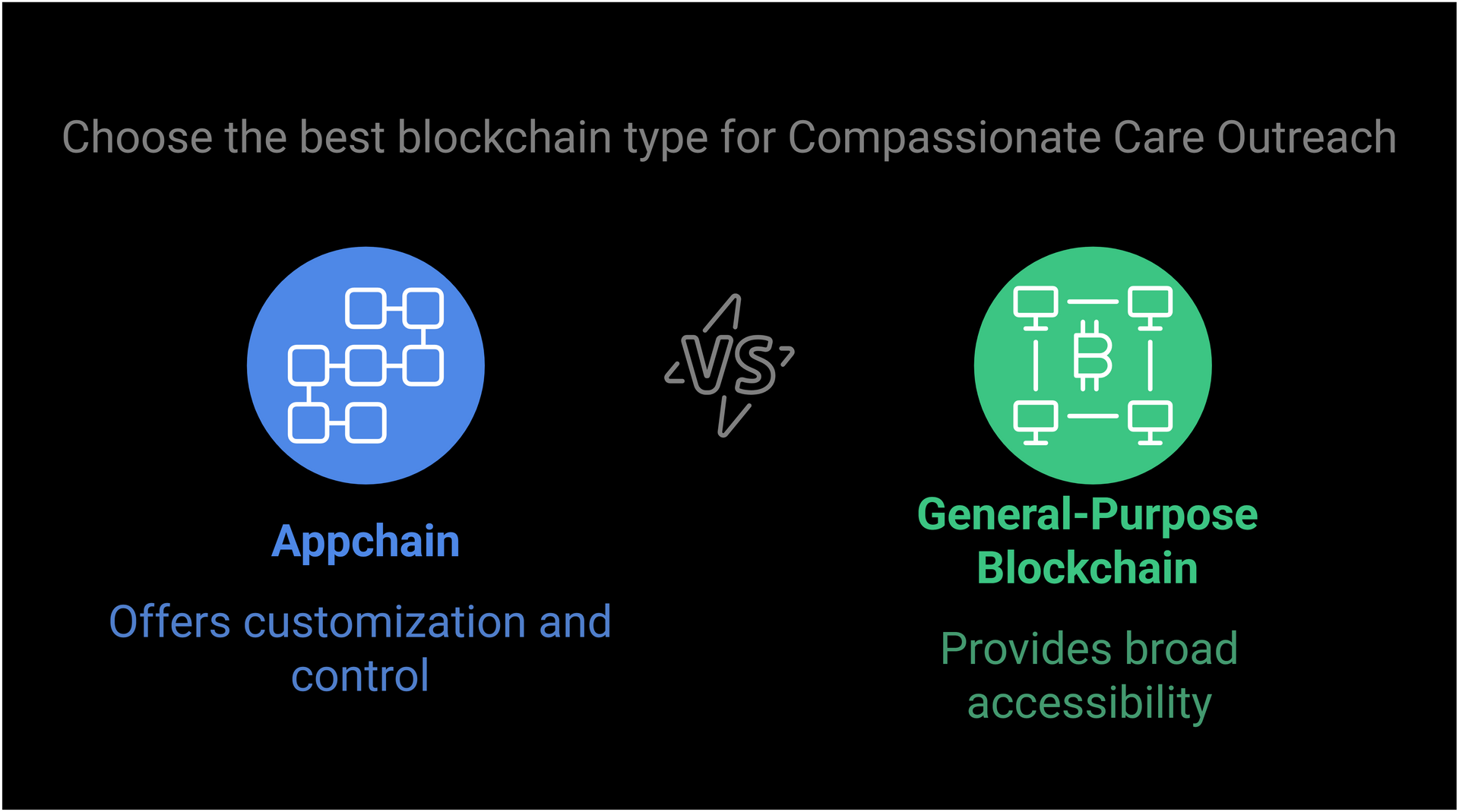
The Technology: Cosmos SD
We have chosen the Cosmos SDK as the framework for building our custom blockchain. The Cosmos SDK is an open-source toolkit designed to simplify the creation of application-specific blockchains. Think of the Cosmos SDK as a "lego kit" that allows developers to choose pre-built modules or create their own. Its modular architecture allows us to add and customize features. The Cosmos SDK also enables us to plug and play with different consensus engines.
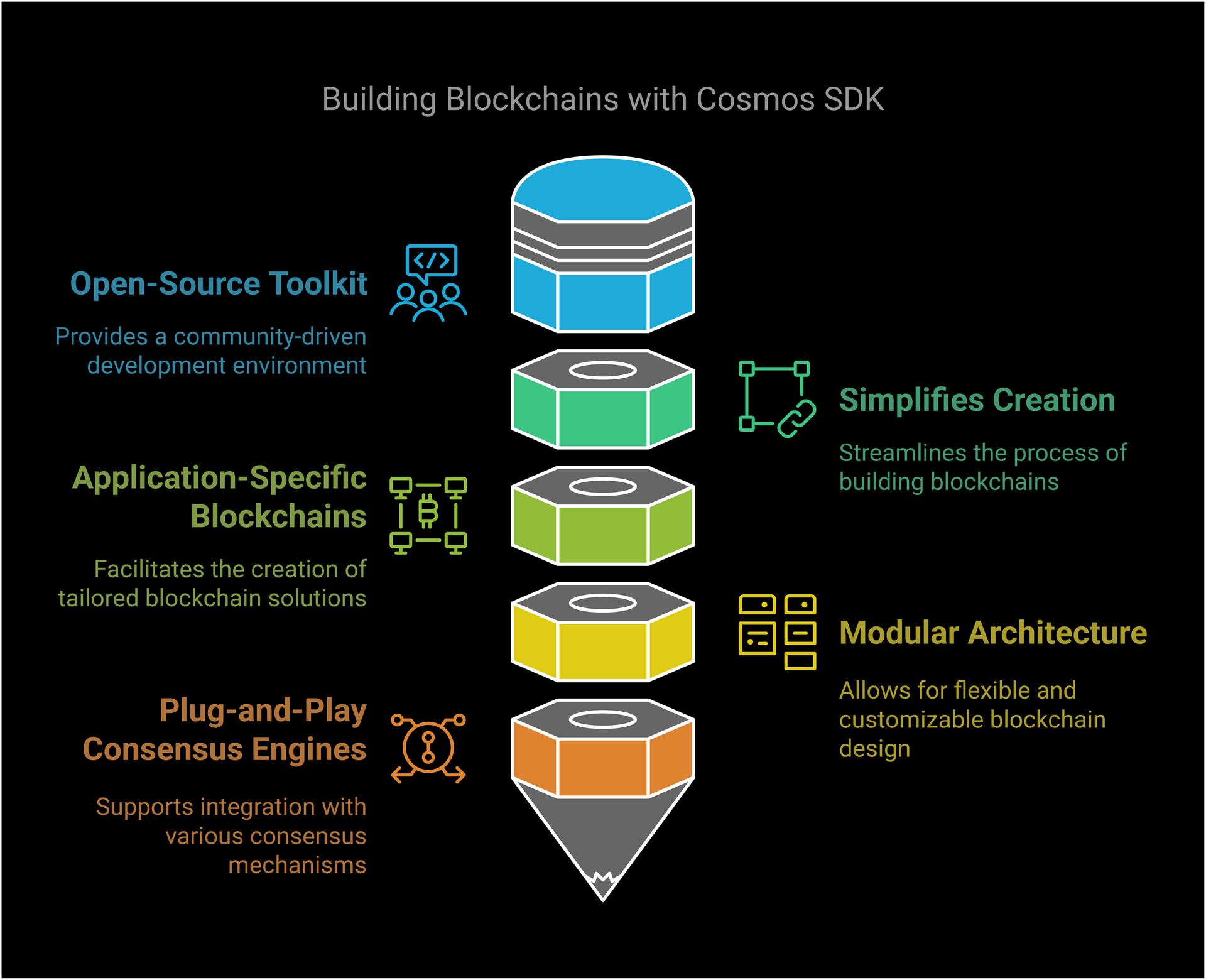
Key Modules
Modules are the building blocks of the appchain. Here are some of the core modules we will use:
Patient Data Module:
This module will securely store and manage patient health records, ensuring compliance with HIPAA and other privacy regulations.
Volunteer Credentialing Module:
This module will verify the qualifications and backgrounds of volunteer healthcare providers, ensuring they are properly vetted before providing care.
Donation and Funding Module:
This module will track all donations and how they are used, providing transparency to donors and other stakeholders.
Supply Chain Module:
This module will track the distribution of donated supplies and equipment, from origin to destination.
Scheduling and Logistics Module:
This module will manage appointment scheduling, transportation, and the logistics of moving supplies and patients.
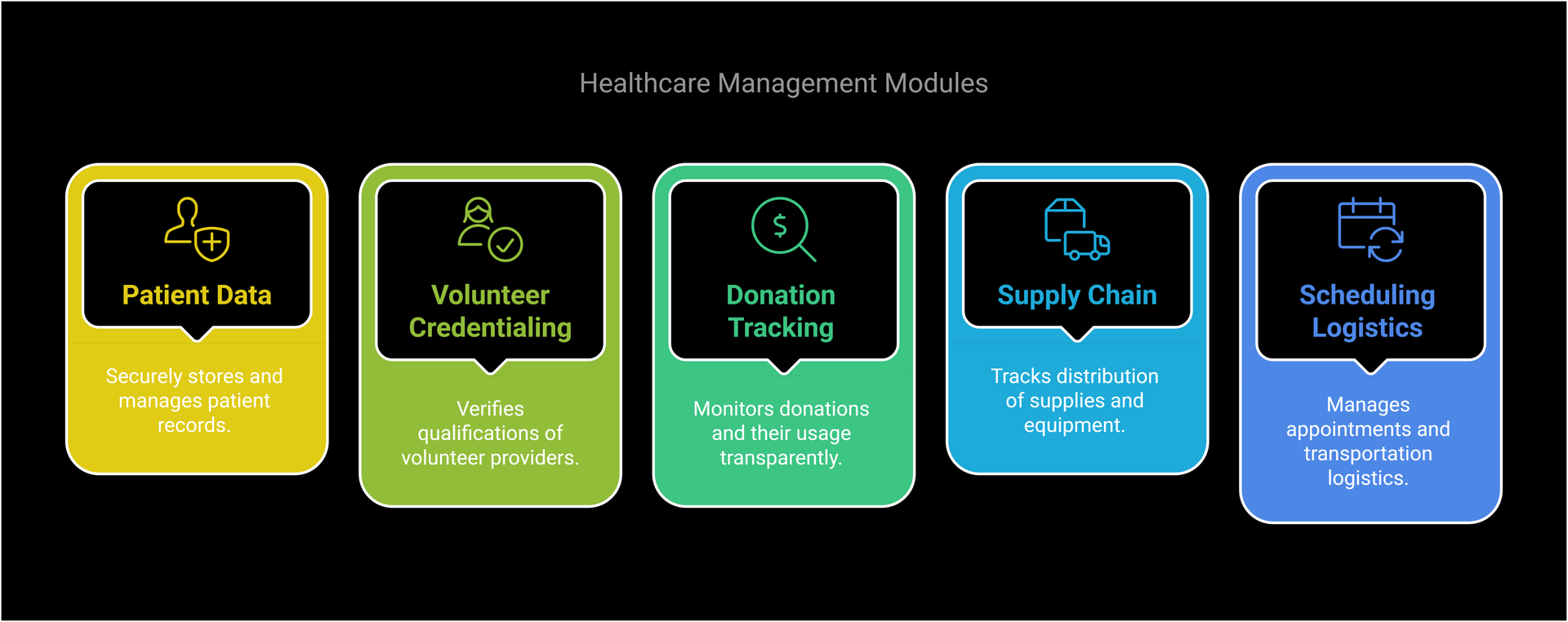
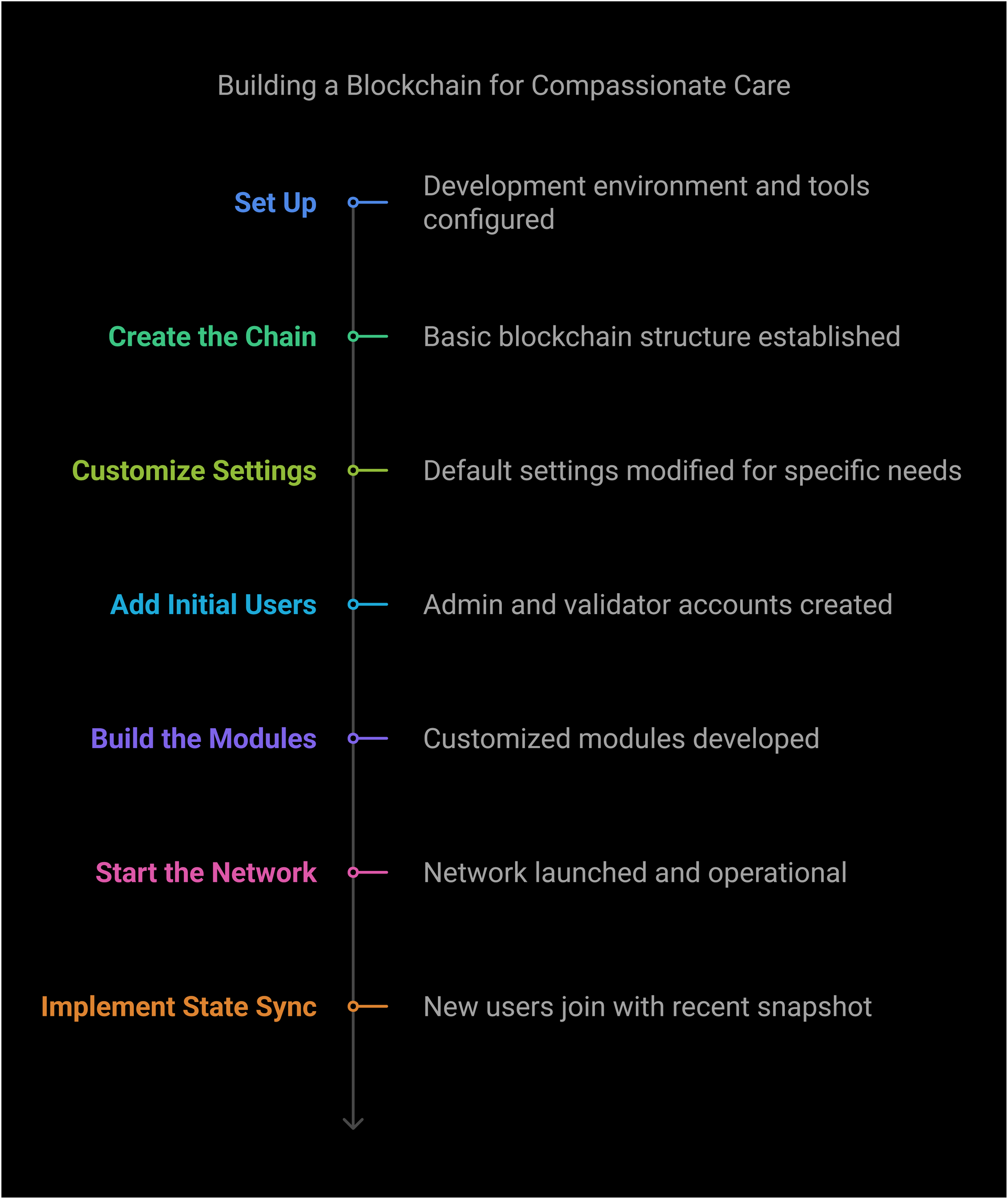
Transparency and Security
Open-Source: The code for the appchain may be made open-source, to allow for public review and auditing, thus fostering transparency and accountability.
Regular Updates: Program milestones, data, and financial reports will be regularly shared on the website, providing ongoing transparency.
Data Privacy: Patient data will be anonymized, and the appchain will be built to be HIPAA compliant, respecting patient privacy at every level.
Advisory Council Oversight: The Advisory Council, comprised of healthcare providers, administrators, and policy experts, will play a key role in overseeing the program, ensuring its integrity and professional standards.
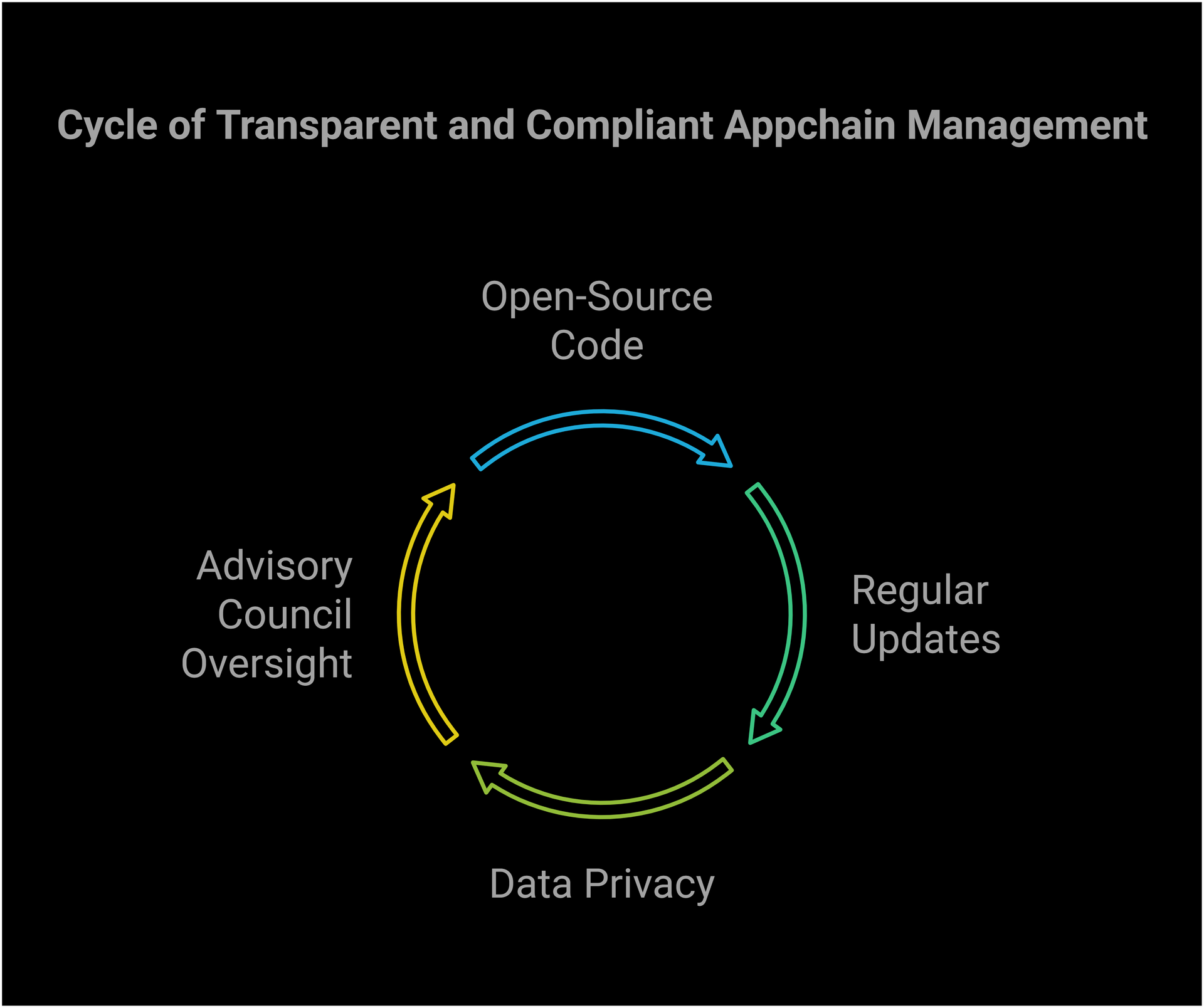
Getting Involved
For Developers: We invite blockchain developers and engineers to contribute to the project and to review the open-source code.
For Volunteers: We encourage healthcare professionals and general volunteers to join the program and utilize the network. By doing so they will be part of the transformation of healthcare for the homeless.
For Donors: Financial support is needed to fund the development and maintenance of the blockchain network, and to provide services to the homeless.
For Partners: Corporations and other organizations can partner with the program to provide assistance, services, or funding.
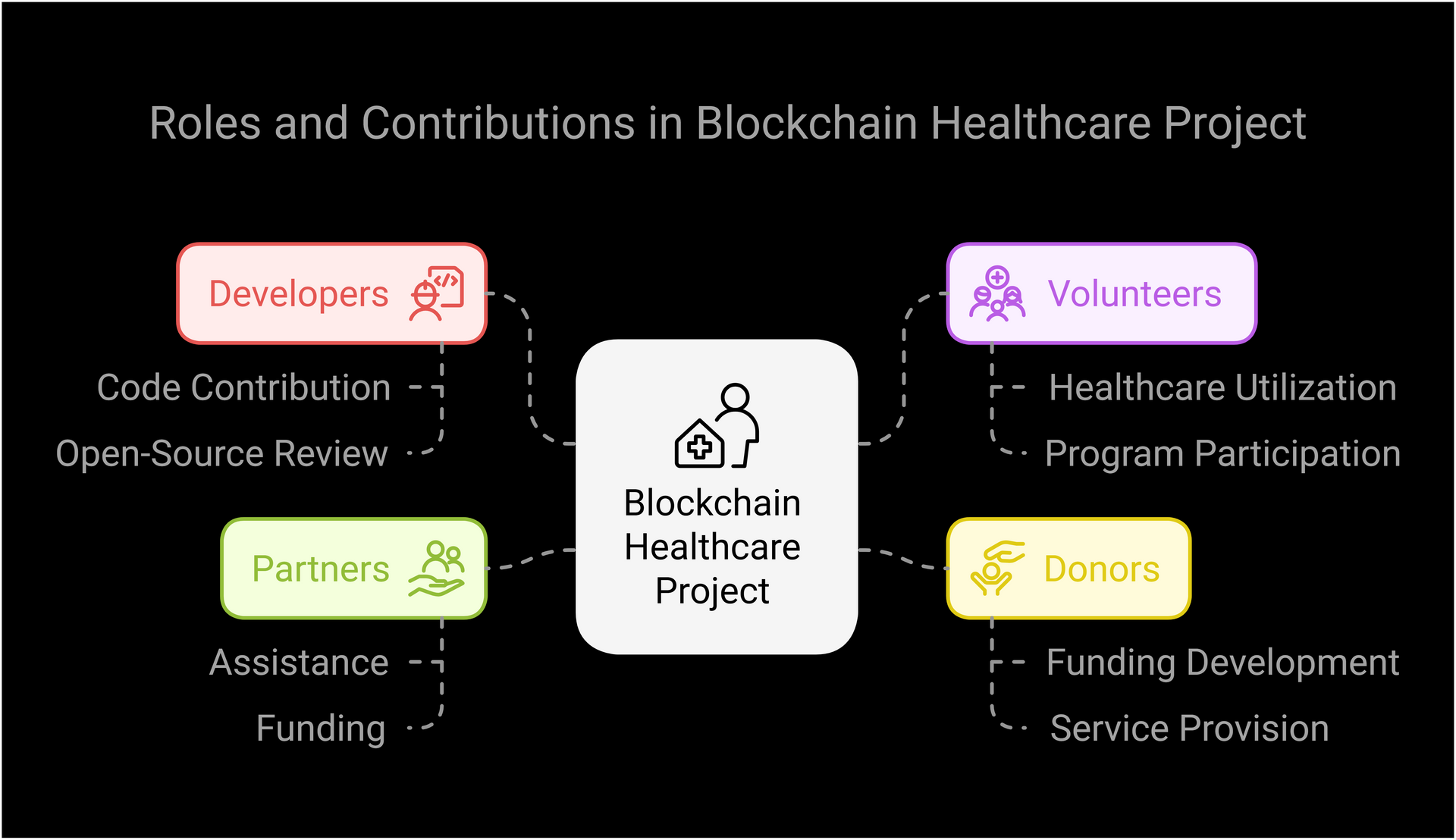
Technical Details
Consensus Mechanism: We may use the CometBFT consensus engine, a mature BFT consensus engine used widely.
Network Architecture: The network will consist of nodes, validators, and modules.
Smart Contracts: The modules are similar to smart contracts on other blockchains but are more specialized to the needs of the program.
API Endpoints: The program will have open APIs that allow for communication between modules and other applications.
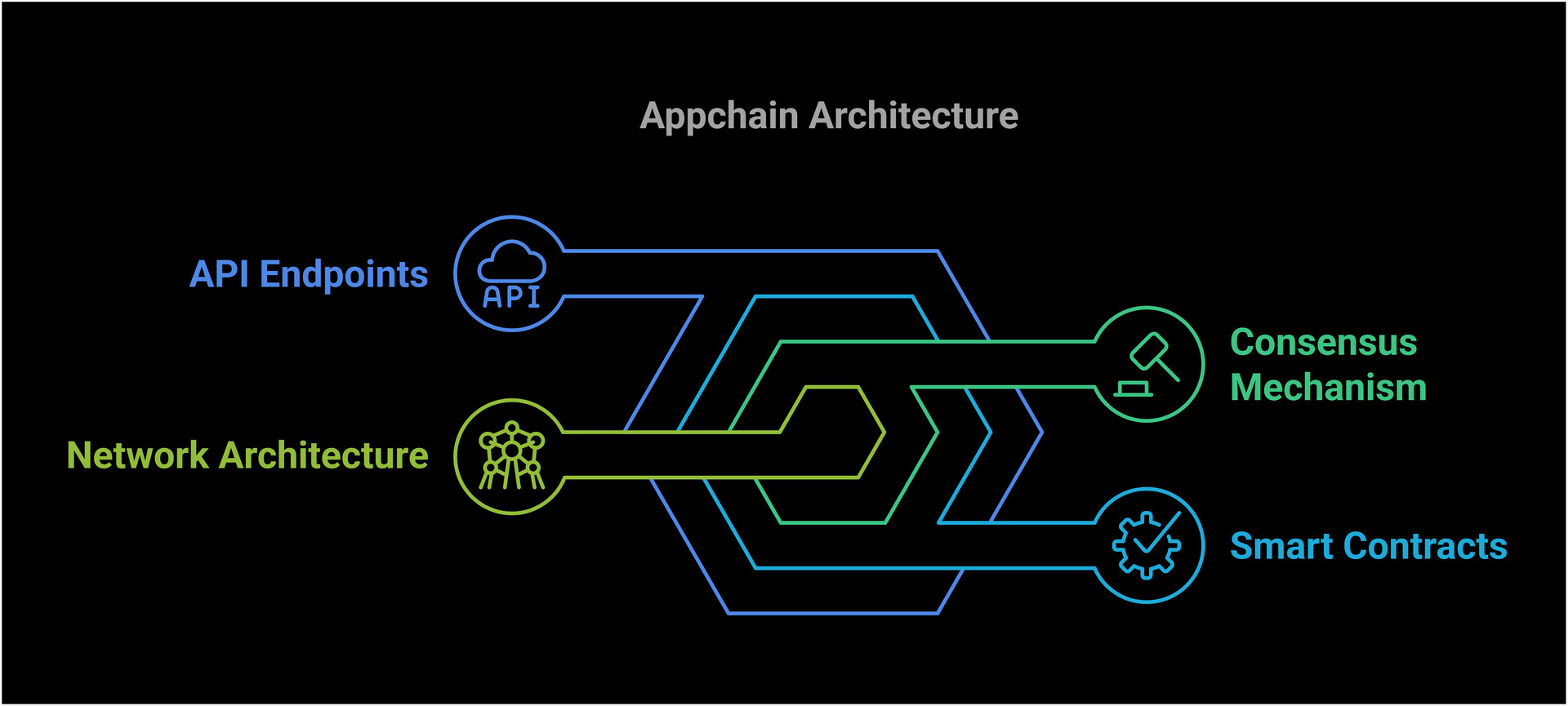
Call to Action
We invite individuals and organizations to get involved in this project that will transform healthcare for the homeless. You can help us ensure that every individual has access to the care they need.
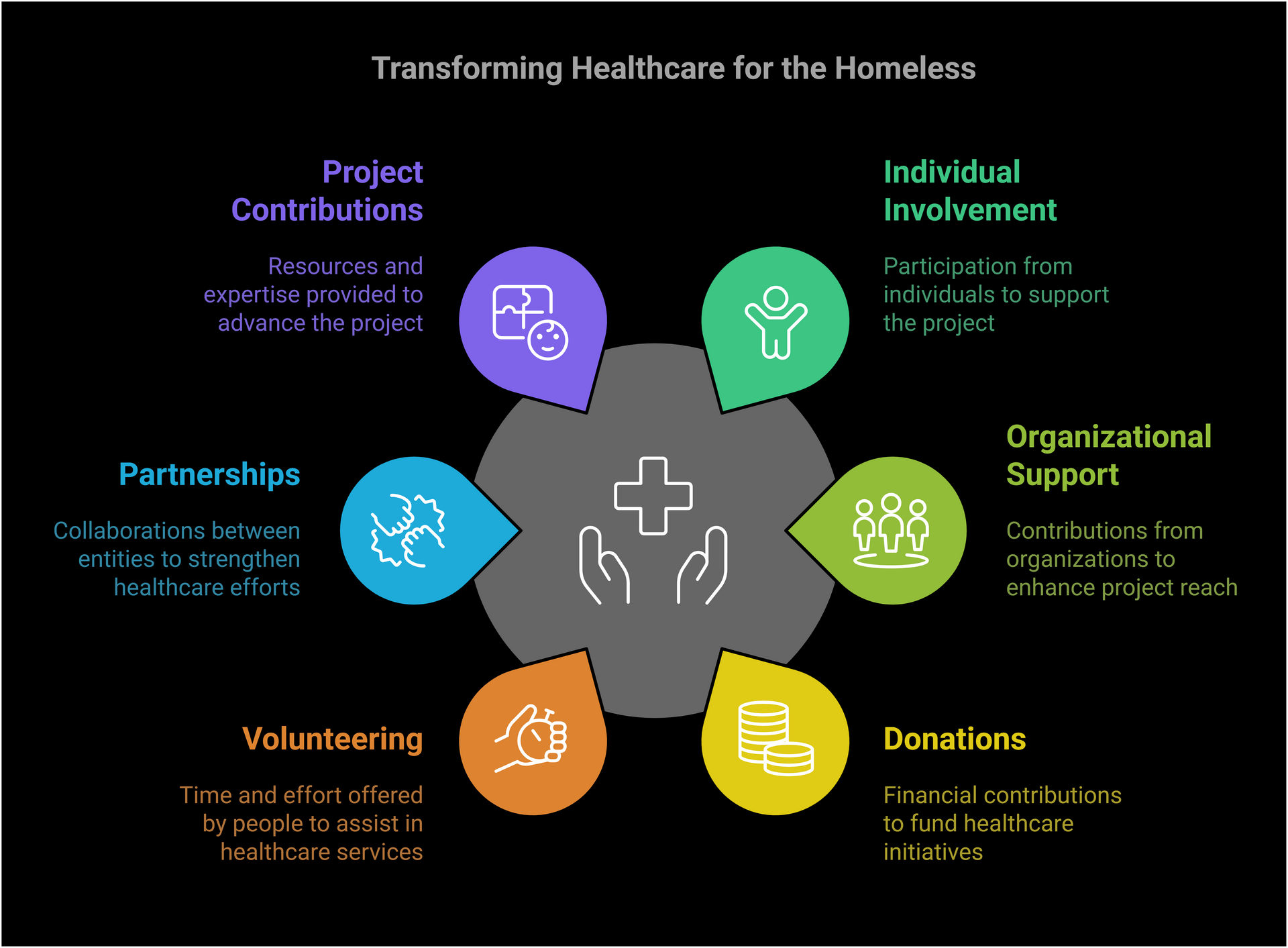
FAQ
What is a blockchain and why is it being used for the Compassionate Care Outreach program?
A blockchain is a digital ledger that records transactions across many computers. It is being used to provide transparency, security, and efficiency to the program, by tracking patient data, volunteer credentials, donations, and logistics in a secure, verifiable way.
What is an appchain?
An appchain is a custom-built blockchain designed for a specific application. It is different from general-purpose blockchains like Bitcoin or Ethereum, and it provides a high degree of customization and control.
How does the Cosmos SDK help build this appchain?
The Cosmos SDK is an open-source toolkit that simplifies the creation of application-specific blockchains. It allows developers to use pre-built modules or create custom ones, making it easier to tailor the blockchain to specific needs.
What kind of data is stored on the appchain?
The appchain will store various types of data, including:
Patient health records, with anonymization to maintain privacy.
Volunteer credentials, to ensure proper vetting.
Donation and funding records, for transparency.
Supply chain information, to track donated goods.
Scheduling and logistics data, to manage appointments and transportation.
How is patient data kept private on the blockchain?
Patient data will be anonymized to ensure privacy. The blockchain will also be built to comply with HIPAA regulations.
Who can see the data on the blockchain?
While the blockchain is public, sensitive data like patient records are anonymized. Stakeholders will be able to see transactions and how resources are used, but personal information will be protected. The Advisory Council will also play a key role in oversight.
How will the program be kept transparent?
The code for the appchain may be made open-source for public review, and regular updates on program milestones and financial reports will be shared on the website.
How does the blockchain make the program more efficient?
The blockchain automates many processes, such as scheduling appointments, managing volunteer credentials, and tracking donations, reducing manual work and increasing overall efficiency.
What is the role of the Advisory Council?
The Advisory Council, composed of healthcare professionals and policy experts, will oversee the program to ensure it operates with integrity and high standards.
Is this a public blockchain?
No, this appchain is a separate, independent system, not connected to any other public blockchain, and it is customized for the Compassionate Care Outreach Program.
What is the "CometBFT consensus engine" mentioned in the technical details?
CometBFT is a mature and widely-used consensus engine that helps to validate new blocks in a blockchain. We may use it to ensure that our appchain operates efficiently and securely.
What if I have more technical questions?
For additional inquiries, please reach out through our contact page or join our developer community for discussions and support.
Genesis | Names of individuals and groups |
Adam
Eve
Cain
Abel
Seth
Noah
Abraham
Sarah
Isaac
Rebekah
Jacob
Esau
Joseph
Judah
Benjamin
Lot
Ishmael
Leah
Rachel
Reuben
Simeon
Levi
Judah
Issachar
Zebulun
Dan
Naphtali
Gad
Asher
Zilpah
Bilhah
Dinah
Er
Onan
Shelah
Pharez
Zerah
Hezron
Hamul
Tola
Phuvah
Job
Shimron
Sered
Elon
Jahleel
Hushim
Jemuel
Jamin
Ohad
Jachin
Zohar
Shaul
Gershon
Kohath
Merari
Belah
Becher
Ashbel
Gera
Naaman
Ehi
Rosh
Muppim
Huppim
Ard
Hagar
Ishmael
Manasseh
Ephraim
Asenath
Potipherah
Beeri
Anah
Zibeon
Adah
Reuel
Jeush
Jalam
Korah
Hanoch
Abida
Eldaah
Shuni
Ezbon
Eri
Arodi
Areli
Jimnah
Ishuah
Isui
Beriah
Serah
Heber
Malchiel
Bilhan
Zaavan
Akan
Dishon
Ezer
Dishan
Uz
Aran
Sheba
Dedan
Asshurim
Letushim
Leummim
Jabal
Jubal
Tubalcain
Naamah
Mahalaleel
Methusael
Jared
Hanoch
Bedad
Hadad
Samlah
Saul
Baalhanan
Hadar
Pau
Adah
Bashemath
Anah
Abimelech
Phichol
Ephron
Atad
Jochebed
Aaron
Miriam
Hur
Uzziel
Mishael
Elzaphan
Sithri
Jemuel
Jamin
Ohad
Jakin
Zohar
Saul
Baara
Hazael
Bedad
Hadad
Masrekah
Shomer
Hotham
Timna
Amalek
Eliphaz
Reuel
Jeush
Jalam
Korah
Magdiel
Irma
Hivites
Arkites
Sinites
Arvadites
Zemarites
Hamathite
Admah
Zeboiim
Zoar
Pharaoh
Potiphar


















